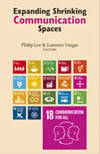
Expanding Shrinking Communication Spaces
On Sale
$4.88
$4.88
Editors: Philip Lee & Lorenzo Vargas
Published in association with The Centre for Communication Rights
Southbound ISBN: 978-983-9054-65-1
Published: January 2020
216 pages, 14.0x21.4cm
ABOUT THE BOOK
All human and social activity depends on communication. No matter the issue — poverty, conflict resolution, self-determination, migration, health, land, housing, the climate crisis — little can be done without effective communication. A framework is needed that enables, empowers, and transforms; that challenges power structures and sociocultural traditions to guarantee the public voices and genuine participation of everyone — especially poor, marginalized, excluded and dispossessed people and communities. Such a framework is offered by the concept and practice of communication rights.
Since communication clearly underpins genuinely sustainable development and requires equitable access to information and knowledge, to information and communication technologies, as well as plurality and diversity in the media, this book identifies the missing UN Sustainable Development Goal 18: Communication for All, whose purpose is to expand and strengthen public civic spaces through equitable and affordable access to communication technologies and platforms, media pluralism, and media diversity.
Contents of the book
I. Introduction by Philip Lee & Lorenzo Vargas
II. Expanding Shrinking Civic Spaces: Envisioning an Inclusive World in 2030 by Philip Lee
III. Communication is Inscribed in Human Nature by Michael Traber
IV. Communication and Information Poverty in the Context of the Sustainable Development Goals (SDGs) by Lorenzo Vargas & Philip Lee
V. Addressing Gender Issues in Media Content by Sarah Macharia
VI. What Do the SDGs Mean for the World’s Indigenous Peoples? by Dev Kumar Sunuwar
About the Authors
Published in association with The Centre for Communication Rights
Southbound ISBN: 978-983-9054-65-1
Published: January 2020
216 pages, 14.0x21.4cm
ABOUT THE BOOK
All human and social activity depends on communication. No matter the issue — poverty, conflict resolution, self-determination, migration, health, land, housing, the climate crisis — little can be done without effective communication. A framework is needed that enables, empowers, and transforms; that challenges power structures and sociocultural traditions to guarantee the public voices and genuine participation of everyone — especially poor, marginalized, excluded and dispossessed people and communities. Such a framework is offered by the concept and practice of communication rights.
Since communication clearly underpins genuinely sustainable development and requires equitable access to information and knowledge, to information and communication technologies, as well as plurality and diversity in the media, this book identifies the missing UN Sustainable Development Goal 18: Communication for All, whose purpose is to expand and strengthen public civic spaces through equitable and affordable access to communication technologies and platforms, media pluralism, and media diversity.
Contents of the book
I. Introduction by Philip Lee & Lorenzo Vargas
II. Expanding Shrinking Civic Spaces: Envisioning an Inclusive World in 2030 by Philip Lee
III. Communication is Inscribed in Human Nature by Michael Traber
IV. Communication and Information Poverty in the Context of the Sustainable Development Goals (SDGs) by Lorenzo Vargas & Philip Lee
V. Addressing Gender Issues in Media Content by Sarah Macharia
VI. What Do the SDGs Mean for the World’s Indigenous Peoples? by Dev Kumar Sunuwar
About the Authors

